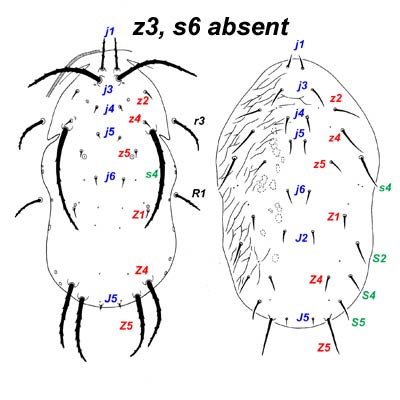Taxonomic Position
Cohort Gamasina
Subcohort Dermanyssiae
Superfamily Phytoseioidea
Family Phytoseiidae Berlese
Subfamily Amblyseiinae Muma
Diagnostic characters:
-
Phytoseiidae with both setae z3 and s6 suppressed (4 anterolateral setae vs 5 or 6)
-
One of the S-series or Z1 usually present.
-
r-R series reduced to 2 pairs of setae, r3 & R1 (except rarely, e.g. Ricoseius loxocheles De Leon which has 3 pairs).

Similar taxa. Phytoseiinae and Typhlodrominae have lost either or both of setae z3 and s6 (6 anterolateral setae). Some distinctive genera of Amblyseiinae are keyed out separately herein: Euseius, Paraphytoseius, Phytoseiulus, Iphiseius.
Ecology & Distribution. Members of the Amblyseiinae are perhaps the most commonly encountered phytoseiid mites, especially members of the genera Phytoseiulus, Amblyseius, Neoseiulus and Euseius, because of their use in biological control.
References
Athias-Henriot, C. 1957. Phytoseiidae et Aceosejidae (Acarina, Gamasina) d'Algerie. I. Genres Blattisocius Keegan, Iphiseius Berlese, Amblyseius Berlese, Phytoseius Ribaga, Phytoseiulus Evans. Bulletin de la Société d'Histoire Naturelle de l'Afrique du Nord 48 : 319-352.
Beard JJ & Walter DE. 1996.
Australian Mites of the
genera Paraphytoseius
and
Paraamblyseius (Acarina: Phytoseiidae). Australian
Journal of Entomology 35: 235-241.
Chant DA. & McMurtry JA. 1994. A review of the subfamilies Phytoseiinae and Typhlodrominae (Acari: Phytoseiidae). International Journal of Acarology 20: 223-310.
Chant DA & McMurtry JA. 2005. A review of the subfamily Amblyseiinae Muma (Acari: Phytoseiidae): Part VI. The tribe Euseiini n. tribe, subtribes Typhlodromalina n , subtribe, Euseiina n. subtribe, and Ricoseiina n. subtribe. International Journal of Acarology 31: 187-224.
Chant DA & McMurtry JA. 2004. A review of the subfamily Amblyseiinae Muma (Acari: Phytoseiidae): Part III. The tribe Amblyseiini Wainstein: subtribe Amblyseiina n. subtribe. International Journal of Acarology 30: 171-228.
Chant DA & McMurtry JA. 2003. A review of the subfamily Amblyseiinae Muma (Acari: Phytoseiidae): Part II. The tribe Kampimodromini. International Journal of Acarology 29: 179-224.
Chant DA & McMurtry JA. 2003. A review of the subfamily Amblyseiinae Muma (Acari: Phytoseiidae): Part I. The tribe Neoseiulini new tribe. International Journal of Acarology 29: 3-46.
Denmark, H. A. 1988. Revision of the genus Paraamblyseius Muma (Acari : Phytoseiidae). International Journal of Acarology 14 : 23-40.
Denmark, H. A. 1993. Revision of the genus Phytodromus Muma (Acari : Phytoseiidae). International Journal of Acarology 19 : 107-121.
Denmark, H. A. and Muma, M. H. 1989. A revision of the genus Amblyseius Berlese, 1914 (Acari : Phytoseiidae). Occasional Papers of the Florida State Collection of Arthropods 4 : 1-149.
Denmark, H. A. and Schicha, E. 1975a. A new species of Amblyseius Berlese (Acarina : Phytoseiidae) from apple in Australia. Proceedings of the Linnean Society of New South Wales 99 : 145-150..
Krantz GW & Ainscough B. 1990. Mesostigmata. pp. 583-665, in DL Dindal (ed) Soil Biology Guide. John Wiley & Sons: Brisbane.
Pritchard EA & Baker EW. 1963. Mites of the family Phytoseiidae from Central Africa, with remarks on the genera of the world. Hilgardia 33: 205-309.
Schicha e.
1987. Phytoseiidae of
Australia and Neighbouring Areas. (Indira Publishing House, Oak Park, Michigan, USA.)
Schuster RO & Pritchard
EA. 1963. Phytoseiid mites of California.
Hilgardia 43: 191-285.
Tseng YH. 1976.
Systematics of the mite family Phytoseiidae from Taiwan, with a revised
key to the genera of the world (II). Journal
of the Agricultural Association of China 94: 86-128.
Walter, D.E.
1999. A review of Australian Asperoseius
Chant, Euseius Wainstein, Okiseius Ehara and Phytoscutus
Muma (Acari: Mesostigmata: Phytoseiidae) with a key to the genera of Australian
Amblyseiinae and descriptions of three new species. Australian Journal of Entomology 38: 85-95.
Walter DE, Azam G., Waite G & Hargreaves J. 1998.
Risk assessment of an exotic biocontrol agent: Phytoseiulus
persimilis (Acari: Phytoseiidae) does not establish in rainforest in
south-east Queensland. Australian
Journal of Ecology 23: 587-592.